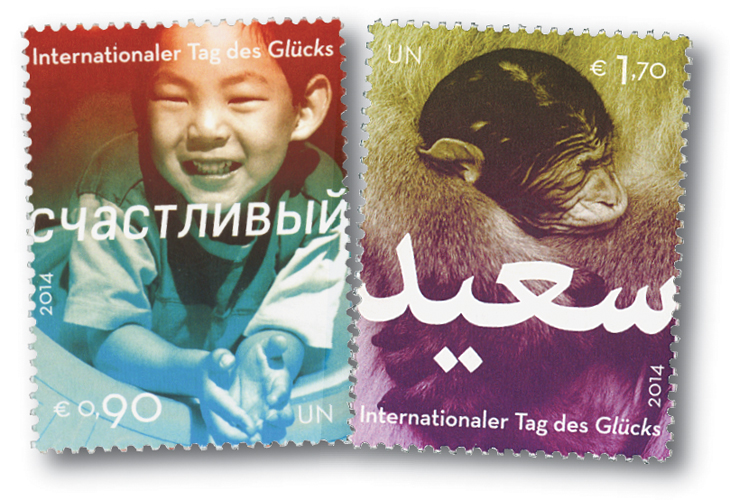
# 3189m FDC - 1999 33c Celebrate the Century - 1970s: America Smiles
1999 33¢ Smiley Face Buttons
Printed By: Ashton-Potter
Printing Method: Offset Press
The International Day of Happiness

On March 20, 2013, the United Nations observed the first International Day of Happiness. The day was created through a unanimous UN resolution, recognizing that happiness and well-being are as important to a successful society as economic goals.

Since 1972, the tiny country of Bhutan has governed and lived under the Buddhist concept that happiness can and should be accessible to all. Their political philosophy places Gross National Happiness over Gross National Product. It focuses on four pillars: good governance, sustainable socioeconomic development, cultural preservation, and environmental conservation. Not surprisingly, it was Bhutan that suggested an International Day of Happiness. The idea passed with a unanimous United Nations resolution in June 2012.

That year the UN also convened its first ever High Level Meeting on Happiness and Wellbeing: Defining a New Economic Paradigm. The group, which continues to meet, studies ways to bring social, economic, and environmental well-being to all humans.

The first International Day of Happiness was celebrated worldwide on March 20, 2013. In his address that day, Secretary-General Ban Ki-moon stated, “The pursuit of happiness lies at the core of human endeavors. People around the world aspire to lead happy and fulfilling lives free from fear and want, and in harmony with nature.

“Yet, basic material well-being is still elusive for far too many living in extreme poverty. For many more, recurring socio-economic crises, violence and crime, environmental degradation and increasing threats of climate change are an ever-present threat.”
He concluded his speech saying, “On this first International Day of Happiness, let us reinforce our commitment to inclusive and sustainable human development and renew our pledge to help others. When we contribute to the common good, we ourselves are enriched. Compassion promotes happiness and will help build the future we want.”

Through its recognition, the UN promotes the importance of general human happiness. It believes happiness should be of primary importance in all public policy and economic goals. And it stresses the notion that progress cannot be measured in economic terms alone. Wellbeing and happiness are fundamental human goals and are equally essential to a complete measurement of “human progress.”

However, the overall happiness of a society is not completely a result of the compassion of political leaders, institutions, and government policies. It starts at an individual level. Social organizations around the world such as CHEERS and Action for Happiness help to inspire acts of joy and “positive psychology” on March 20, and throughout the year. People are encouraged to share their personal happiness with their friends, family, co-workers, and even with strangers. After all, a little bit of joy and a few kind acts a day can become a contagious a habit!

1999 33¢ Smiley Face Buttons
Printed By: Ashton-Potter
Printing Method: Offset Press
The International Day of Happiness

On March 20, 2013, the United Nations observed the first International Day of Happiness. The day was created through a unanimous UN resolution, recognizing that happiness and well-being are as important to a successful society as economic goals.

Since 1972, the tiny country of Bhutan has governed and lived under the Buddhist concept that happiness can and should be accessible to all. Their political philosophy places Gross National Happiness over Gross National Product. It focuses on four pillars: good governance, sustainable socioeconomic development, cultural preservation, and environmental conservation. Not surprisingly, it was Bhutan that suggested an International Day of Happiness. The idea passed with a unanimous United Nations resolution in June 2012.

That year the UN also convened its first ever High Level Meeting on Happiness and Wellbeing: Defining a New Economic Paradigm. The group, which continues to meet, studies ways to bring social, economic, and environmental well-being to all humans.

The first International Day of Happiness was celebrated worldwide on March 20, 2013. In his address that day, Secretary-General Ban Ki-moon stated, “The pursuit of happiness lies at the core of human endeavors. People around the world aspire to lead happy and fulfilling lives free from fear and want, and in harmony with nature.

“Yet, basic material well-being is still elusive for far too many living in extreme poverty. For many more, recurring socio-economic crises, violence and crime, environmental degradation and increasing threats of climate change are an ever-present threat.”
He concluded his speech saying, “On this first International Day of Happiness, let us reinforce our commitment to inclusive and sustainable human development and renew our pledge to help others. When we contribute to the common good, we ourselves are enriched. Compassion promotes happiness and will help build the future we want.”

Through its recognition, the UN promotes the importance of general human happiness. It believes happiness should be of primary importance in all public policy and economic goals. And it stresses the notion that progress cannot be measured in economic terms alone. Wellbeing and happiness are fundamental human goals and are equally essential to a complete measurement of “human progress.”

However, the overall happiness of a society is not completely a result of the compassion of political leaders, institutions, and government policies. It starts at an individual level. Social organizations around the world such as CHEERS and Action for Happiness help to inspire acts of joy and “positive psychology” on March 20, and throughout the year. People are encouraged to share their personal happiness with their friends, family, co-workers, and even with strangers. After all, a little bit of joy and a few kind acts a day can become a contagious a habit!














